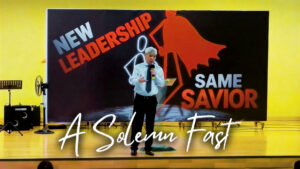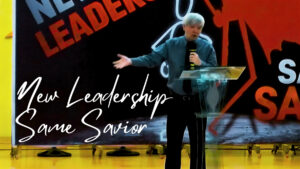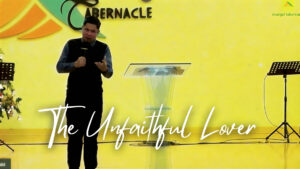Scripture Reading: Hebrew 12:18-23; Isaiah 44:6
This morning let’s talk about the Christian race. The first part of this Hebrew Epistle mentions the perils of drifting; referring to Christians who are just being hearers, drifting along, and doing nothing at all about God’s work of salvation in him or her. The second part which we are touching on deals with the peril of remaining stationary. God is wanting us to get into the Christian race, not drifting along. We are racers. One of the greatest dangers in the Christian life is the peril of just remaining stationary, of doing nothing. A little lady got up and gave her testimony. She said, ‘The Lord filled up my cup twenty years ago. Nothing has run in, and nothing has run out.’ The old cowboy sitting in the back spoke out and said, ‘I bet it’s filled with wiggle tails (worms) by now.’ I think that is the condition of a lot of believers today. They can say the Lord has filled their cup, but there’s no running over. They’ve just remained that way. I agree with the cowboy, there are a whole lot of wiggle tails in the cups that people are boasting of today. Please remember that the Dead Sea is called the Dead Sea because nothing has run in and nothing has run out. God forbid that our live is lived in that manner.
God wants us to move out and live by faith. And God is saying to all of us here today, do not be afraid of life and what is ahead of you? Why can we be not afraid?
1. We are not under the Law
You have not come to a mountain that may be touched and to a blazing fire, and to darkness and gloom and whirlwind. Hebrew 12:18
Moses gave the Law before a mountain that burned with fire and shook the plain. I notice how many religious people live under the law. They go to church on their knees and walk with their knees all the way to the front of the pew. They are under the bondage of the Law. Life to them is darkness, gloom and whirlwind. Those who are tempted to return to the law should remember the terrifying circumstances that attended the giving of the law and should draw spiritual lessons from them. The scene was Mount Sinai, a literal, tangible mountain that was all on fire. It was enveloped in a pall or veil (the whole mountain was covered by an ominous thick cloud) that made everything seem indistinct, obscure, and nebulous (unclear, vague, and ill-defined). A violent storm raged around it. In addition to these natural disorders, there were terrible supernatural phenomena. A trumpet blasted away, and a voice thundered out so ominously (threateningly) that the people pleaded for it to stop. They were completely unnerved by the divine edict that “If so much as a beast touches the mountain, it shall be stoned to death.” The Israelites at that time were previously from Goshen, Egypt, where they reared sheep, cow and animals. Maybe some of these sheep or cows gazed at the foot of the mountain and died. They knew that if it meant death to a dumb, uncomprehending animal, how much more surely it would mean death to those who understood the warning. The entire scene was so terrifying and forbidding that Moses himself was trembling. Is our relationship with God so terrifying, forbidding and it leaves us trembling? All this speaks eloquently of the nature and ministry of the law. It is a revelation of God’s righteous requirements and of His wrath against sin. The purpose of the law was not to provide the knowledge of salvation but to produce the knowledge of sin. It speaks of distance between God and man because of sin. It is a ministry of condemnation, darkness, and gloom. It speaks of the attitude towards our Christian life with God. Is our life lived in condemnation, darkness and gloom? The walk with God is not darkness, gloom and whirlwind. Believers have not come to the forbidding terrors of Sinai but to the welcome of grace: There is no similarity between the experience of Israelite people under the old covenant and that of Christians under the new. Events that accompanied the giving of the law at Mount Sinai show that people saw the old covenant as something terrifying. By contrast, Christians see the new covenant as something joyful. That is why God declared ‘Behold I do a New Thing.’ We are not kept at a distance from God as the Israelites were at Mount Sinai, but come right into his unseen heavenly presence. We are members of the community of God’s people, where they are united with the faithful of all ages. Because of Christ’s blood, believers do not fear judgment. The death of Christ brings forgiveness for the sinner. We no more live under the law but we live under grace.
2. We are under grace
But you have come to Mount Zion…to God, the Judge of all, and to the spirits of righteous men made perfect and to Jesus, the mediator of a new covenant. Hebrew 12:22
We do not come to a tangible mountain on earth. Our privilege is to enter the sanctuary by faith like what we are doing right now in this tabernacle. We can just come to Evangel Tabernacle by grace through faith. I have been away for 2 months. But just yesterday when I drove into this church, I made a statement to Pastor Lily, ‘Can you sense the peace and serenity in this place?’ She replied, ‘Of course, that is because of the presence of God.’ By faith, we approach God in confession, praise, and prayer. We are not limited to one day of the year ( that only the high priest has the privilege to enter), but all may enter the holiest at any time with the knowledge that we are always welcome. God no longer says, “Stay at a distance”; He says, “Come near with confidence.” So this morning God wants you to come near him with confidence. Law has its Mount Sinai but faith has its Mount Zion. We learnt about this Mount Zion in Eschatology that will literally come down from heaven. This heavenly mountain symbolizes the combined blessings of grace—all is ours through the redeeming work of Christ Jesus. It is a heavenly capital. The city of the living God, the city which has no foundations, whose Architect and Builder is God. What I learn about Mount Zion is that it is peaceful, the people that dwell in it find healing and perfection. As we enter the presence of God, we are surrounded by an august gathering. First of all, there are myriads of angels who though untainted by sin cannot join with us in song because they do not know “the joy that our salvation brings.” Then we are with the general assembly of the firstborn ones who are registered in heaven. These are members of the church, the Body and Bride of Christ, who have died since Pentecost and are now consciously enjoying the Lord’s presence. They await the Day when their bodies will be raised from the grave in glorified form and reunited with their spirits.
I read again ‘You have not come to a mountain that can be touched and that is burning with fire; to darkness, gloom and storm; to a trumpet blast or to such a voice speaking words that those who heard it begged that no further word be spoken to them, because they could not bear what was commanded: “If even an animal touches the mountains, it must be stoned.” The sight was so terrifying that Moses said, ‘I am trembling with fear.’ No, you have come to Mount Zion, to the city of the living God, the heavenly Jerusalem, and to thousands of angels in joyful assembly.’ God isn’t scary as like the Israelites in the past. Because Jesus is the world’s saviour and we are God’s beloved children. Mount Sinai was a place of fear which separated God from his people. Mount Zion represents a new community and a new relationship with God. Because Christ rules our lives, the Holy Spirit is always with us, and we experience close fellowship with other believers.
3. Jesus is the Author and Perfector of our faith
Jesus the Author and Perfector of our faith. Hebrew 12:2
He is both the Author and Perfecter of our faith. The word “author” (archēgon) was used in Hebrew 2:10 and suggests that Jesus “pioneered” the path of faith Christians should follow. He also “perfected” the way of faith since He reached its end successfully. He kept His eye on the joy set before Him, the “joy” wherein He obtained an eternal throne. As we run we can look back and see how Jesus ran His race. When we look ahead we can see His exaltation. He is our example as starter and finisher. This example of faith given should encourage the Christians to face their difficulties with similar perseverance. They must remove the sin that hinders, and strengthen themselves to withstand defeat. They will be encouraged to endure as they consider the sufferings that Jesus endured and the heavenly reward that he now enjoys. Whatever we Christians may have to endure, our sufferings are small when compared with those of Jesus Christ. At least our faith has not yet cost us our lives. We should fix our focus on faith. He is the supreme model of preserving faith. Yes we have all the cloud of witnesses who has gone on before us and is at the grandstand cheering us to move on and move out in faith. But Jesus is the supreme model of persevering faith. We should have single focus on him. The name ‘Jesus’ focuses on Jesus’ humanity; in the flesh, he faced suffering and thus is able to help us. Each member of the ‘great cloud of witnesses’ can be inspiring but Jesus provides the ultimate example. When I walk this Christian life, when things are difficult I will think of Abraham, the promise that God gave him. I will think of Jacob, a very human person full of mistakes and yet became the father of the Nation Israel. I will think of Joseph, and his dream. They are the witnesses and they cheered me on to finish this race. But the best encourager is still Jesus. He is not only the ‘author’ the pioneer of the path of faith but He is also the ‘perfector’. In Greek perfector means ‘teleioten.’ It means finisher, the one who brings us to our intended goal. He is cheering us on and helping us in all angles and all available opportunity. He believes the best in us. He only writes good things about us. Pastor Lily says that one day she will write an autobiography of her life as a missionary. Here Jesus is our auto biographer. He is greater than our earthly father. There was a famous football coach in the East of United States. This coach had a player who was known for two things. The first thing he was noted for was his faithfulness at football practice. He was the first one out and the last one to leave, but he never could make the team – he just wasn’t quite good enough. The second thing he was famous for was that his father often visited him on campus and they would be seen walking arm in arm across campus, very much engrossed in conversation. Everyone noticed that and thought it was wonderful. Well, one day the coach got a telegram saying that the boy’s father had died. The coach was the one chosen to tell the sad news to the boy, and so he called him in and told him. The boy was greatly shaken, of course, and had to go home for the funeral. But he was present again at the next game, sitting there on the bench. Then he came over to the coach and said, ‘Coach, this is my fourth and last year, and I’ve never played in a game. I’m wondering if today you could put me in for just a few minutes and let me play.’ And so the coach put him in because the boy’s father had just died. To his amazement, the boy turned out to be a star! The coach had never seen anyone play a better more brilliant game, than this boy played – so he never took him out of the game. When the game was over, the coach called the boy off to the side and said to him. ‘Listen, I’ve never seen anyone play like you played today, but up to today you were the lousiest football player I’ve ever seen. I want an explanation.’ And the boy said, ‘Well Coach, you see, my dad was blind (when he was alive), and this is the first day that he ever saw me play football.’ Jesus is watching us and cheering us on.
Brothers and Sisters, God has saved us from sin. He has brought us into heavens, actually into the holy place, and He has made us to sit in heavenly places. He’s given to us His Holy Spirit. But in spite of all that He has provided, the average Christian falls down and stumbles and wanders like a man lost in the dark. What is wrong with the Christian life as it is being lived at the present time? I believe I know the answer. The problem is that Christians do not go on with God. They get saved, give a testimony of their salvation, and that’s all they ever have. They never maintain a serious study of the Word of God, which is essential to growth. They are like the little girl who fell out of bed one night. When the little girl began to cry, her mother rushed in and said, ‘Honey how come you fell out of bed?’ The little girl replied, ‘I think I stayed too close to the place where I got in’. That is the problem of the Christian today. We stumble and falter and fail because we are staying too close to where we got in. We stayed too close to the world. We need to go on. We need to move out and live by faith.
4. We have Jesus who sympathizes with us
We do not have a high priest who cannot sympathize with our weaknesses, but One who has been tempted in all things as we are, yet without sin. Let us therefore draw near with confidence to the throne of grace, that we may receive mercy and may find grace to help in time of need. Hebrew 4:15
I have always felt that for the nation of Israel Aaron’s death was in one sense of greater significance than the death of Moses. Aaron was their great high priest. Many Israelites had been brought up with Aaron, had played with him as a boy, and had gone through the wilderness with him. They could go to Aaron and say, ‘look, Aaron, I did this and I should not have done it. I have brought my sacrifice.’ And Aaron could sympathize with them. He knew exactly how they felt. But when Aaron died I imagine they wondered whether that new priest, the son of Aaron, could understand. Would he be able to sympathise and to help? This morning he have a Great High Priest who is always available, and He does understand. He does not understand as theoretically, but down here He was tested, and he was ‘touched with the feeling of our infirmities.’ He knew what it was to hunger. He knew what it was to be touched with sorrow – Jesus wept! He knew what it is to be tempted with riches. He knew what it is to be elevated by man. He knew what it is to be tempted by women. ‘Let us therefore come boldly unto the throne of grace.’ The word boldly is a very interesting word in Greek. It is ‘parrhesia.’ It denotes the freedom of speech. It is to feel that the average citizen should have freedom to speak. So it means ‘Let us therefore come (with great freedom) unto the throne of grace’. We can speak freely to the Lord Jesus Christ. I can tell Him things that I cannot tell you. He understands me. He knows my weaknesses and I might just as well tell Him. I have learned to be very frank with Him. I have not attempted to become buddy buddy with Him – I despise that approach. He is God, and I come to worship him with reverence. But I am free to speak because He is also a man. I can tell him my temptation and how I feel and He understands. I can tell Him what is on my heart. I can open my heart to Him. I personally believe all these very pious and flowery prayers we make are not impressive to Him – especially when we are attempting to cover up what is in our hearts and lives. I wonder if the Lord doesn’t tune us out when we do not come to Him with freedom and open our heart to Him. We come to Him rather restrained, without being open and sincere.
Also God’s throne is a throne of grace. Formerly in Mount Sinai it was a throne of judgment. It is now a mercy seat, a throne of grace. Why? ‘That we may obtain mercy.’ We need a lot of mercy. Mercy is something that is in one sense negative – it speaks of the past. We are redeemed by the mercy of God. ‘Not by works of righteousness which we have done, but according to his mercy he saved us. He has been merciful to me.
5. Do not be afraid. He is the first and the last
Thus says the LORD, the King of Israel and His Redeemer, the LORD of hosts: I am the first and I am the last, and there is no God besides Me. — Mighty God, Eternal Father, and Prince of Peace. Art Thou not from everlasting, O LORD, my God, my Holy One? We will not die. Thou, O LORD, hast appointed them to judge and Thou, O Rock. Isaiah 44:6
Our Lord is unique—the only true God. He challenges any so-called god to predict the future as He does, especially with regard to us, his people. His people need not fear any challenge to His supremacy. We are His witnesses that He has foretold the future, and that He is the only God. He Himself does not know of any other genuine Rock. The Lord argued for His uniqueness (apart from Me there is no God). There we, His people should not be afraid of anything. We ourselves are witnesses to His uniqueness, strength, and stability. Hab 1:12 says ‘Art Thou not from everlasting, O LORD, my God, my Holy One? We will not die. Thou, O LORD, hast appointed them to judge and Thou, O Rock.’ The prophet Habakkuk’s long-standing concern which finally erupted into a volcanic complaint was twofold. First, he wanted to know why God seemed so indifferent: Why doesn’t God hear? Second, he wanted to know why God seemed so insensitive: Why doesn’t God help? Habakkuk’s words “How long show his agony over God’s seeming delay in responding to the prophet’s concerns. Many Christians today sense the same problem. They wonder why God seems silent when they pray. Habakkuk went to God to complain about his troubles and the troubles of his people. He described the injustice that was rampant around him and then asked ”How long?“ “Why? Then God gave the answer that no matter what we go through, we will not die. “We will not die” means that Habakkuk knows that whatever comes in our lives it will not totally wipe us out. We, God’s people somehow will live. Under the faithful hand of God, we must realize that the testing were given to correct, not annihilate. ‘O Rock’ is a title for God which expresses His immovable and unshakeable character that we will not die.





